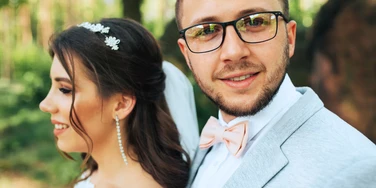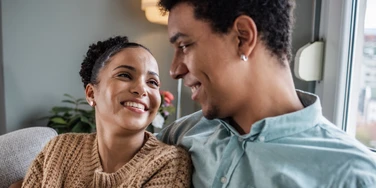Is intense physical chemistry a sign that the two of you are meant to be? Or is it a signal that you’re going down a familiar path leaving you heartbroken again? How can you tell if intense chemistry is love versus simple lust?
To determine whether this is love vs. lust, you’ll have to get some objectivity by slowing down the dating process. You’ll also have to be aware of your patterns and strategies for giving and receiving love so you don’t sabotage your results. Discovering an ideal match for you takes time.
Here are five subtle signs your relationship is all chemistry and no love:
1. You've lost yourself in the relationship
If your friends complain that you disappear every time you feel intense chemistry with a new guy, you may have an unhealthy pattern of sacrificing yourself in a relationship. Merging quickly and allowing your needs and wants to take a backseat to your partner’s is a clear signal that you have an unhealthy pattern that needs to be addressed before you can find lasting love.
A healthy relationship is when one whole and complete person comes together with another whole and complete person. Together they create a new entity — the relationship. Instead of relying on the other person to complete you, or fix you, there’s a balance of effort between the two of you to keep the relationship thriving.
Use extreme caution if you continually bend to your partner’s will and give up asking for your needs and wants to be met. Be aware of twisting into a pretzel to try to earn love. Research from 2022 shows that making significant sacrifices can sometimes be detrimental to personal well-being and can lead to imbalances within the relationship if not done reciprocally.
Remember, you are worth loving as-is — no change required.
2. You're overly focused on attraction rather than substance
 cottonbro studio / Pexels
cottonbro studio / Pexels
If you reject someone outright after one date because you don’t feel intense chemistry, then you may be putting too much emphasis on the wrong qualities for love to last. It can be exciting and romantic to have a 24-hour first date, but it is unlikely to end well.
Chemistry is a necessary ingredient for a healthy relationship, research from 2021 claims. You should never sacrifice it. But don’t put more importance on attraction than all the other qualities necessary for a relationship to thrive and last. You may think you know after one or two dates if there is any chemistry, but you can have off-the-charts chemistry with someone who is not at all the kind of person you would want as a life partner.
To determine love vs. lust you need to have the spark of chemistry present, and then discover over time if there is enough there for love to develop between the two of you. Ideally, you’ll want to cultivate discernment through the dating process. Love and affection become even stronger when you feel emotionally safe and supported by your partner.
3. You're addicted to the feeling of falling in love
Falling in love is so intoxicating that many scientists equate it with the high that comes from high-quality drugs. And the truth is, you are on drugs when you are in the Romance Stage of a relationship. Your brain is being flooded with chemicals when you feel infatuated with your new guy.
Feelings of euphoria, and the release of a medley of chemicals in the brain, including dopamine (pleasure), adrenaline (fight or flight), and norepinephrine (alertness), can make falling in love into an addictive rush. Adrenaline, for example, causes your cheeks to feel flushed, your palms to feel sweaty, and your heart to race when you’re with someone you like.
If you crave these feelings and get bored quickly when the chemicals wear off you could be addicted to the feeling of falling in lust. The problem is that you mistake it for love.
You’ll have to wean yourself off those feelings and develop the skills to navigate through the inevitable power struggle that comes when the chemicals wear off. Lasting love is possible when you know how to recreate the romance with someone you’ve known for years.
4. Your adrenaline is calling the shots
 Vlada Karpovich / Pexels
Vlada Karpovich / Pexels
Fear and excitement feel the same in your body. The adrenaline that causes your heart to race, your breath to become shallow, and your palms to become sweaty is triggered by both of these emotions. The difference between fear and excitement is your internal dialog while you are experiencing these body sensations.
Many motivational speakers will encourage you to take your fear and turn it into excitement. If you are terrified of speaking in front of a group, you can tell yourself that you are excited to share your expertise, and those body sensations are occurring simply because you care.
However, the reverse is also true. You could confuse a fear response for excitement. Your subconscious is yelling, “This is familiar! This is familiar!” when you meet a handsome stranger.
Unfortunately, this part of your brain cannot judge, so it has no idea if the familiar is good for you or bad for you. Its job is to steer you toward what you already know. To discern between love vs. lust it’s up to you to recognize the familiar signal and avoid falling into your unhealthy patterns.
5. You're filling in the blanks
All those chemicals flowing through your brain can easily cloud your vision. The hope that you’ve finally met your soulmate can further confuse your sense of reason.
People who get scammed ignore obvious signs. They get caught up and invest emotionally in someone they barely know or never met.
Instead, approach the early stages of dating (both online and IRL) with healthy skepticism and never give a stranger the benefit of the doubt. That has to be earned over time. So, don’t share personal information or make excuses for bad behavior because you want it to work this time. Do not wear rose-colored glasses through the dating process and allow yourself to be objective and discover who he is.
Then once you’re in a committed, long-term relationship you’ll want to put on your rose-colored glasses and see your partner in his best light. That’s because he will have earned the benefit of the doubt through his consistent actions over time.
Just because you feel intense chemistry doesn’t automatically mean that the relationship is going to end badly. Chemistry and attraction can transform into a healthy, respectful, loving relationship.
You must know how to move beyond just the physical and evaluate if something more meaningful is possible. Take time to discover if you are compatible beyond the bedroom.
Use your emotional guidance system to determine if he can be the right man for you. Notice how you feel when you are with him and how you feel when you part. If he triggers feelings of insecurity or a critical inner voice, then he’s probably part of your unhealthy pattern.
Pay attention to how he spends his time, his energy, and his resources. This will give you insight into what is important to him and can help you discover if you share similar life goals and values.
Notice what happens when you make a request or when there is a conflict. Does he minimize your feelings or get defensive?
Or is he able to hear you, share his feelings, and be vulnerable? When you can navigate through your differences to repair and reconnect then you can create magic together. Opening up and being vulnerable is what allows a relationship to be healthy, 2020 research confirms.
Yeast is necessary to make bread rise, and you need chemistry to keep the spice alive in a romantic relationship. You won’t ever be satisfied with just a cracker when you want chewy on the inside, crunchy on the outside yummy bread.
Don’t put aside physical chemistry as if it is something you don’t need or can’t trust simply because it has caused problems for you in the past. Instead, notice when the chemistry is so intense that it throws you off as this is likely a signal that this is not the right person for you long-term.
Orna and Matthew Walters are dating coaches and founders of Creating Love On Purpose with a holistic approach to transforming hidden blocks to love, and the authors of Getting It Right This Time.
This article was originally published at Creating Love On Purpose. Reprinted with permission from the author.



